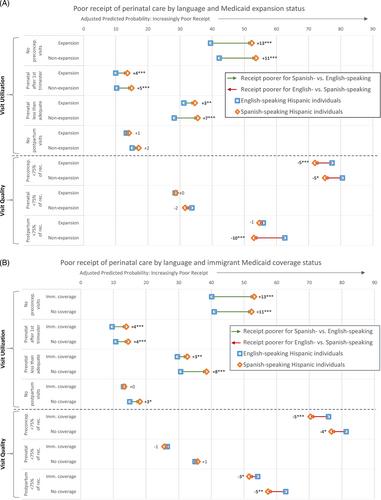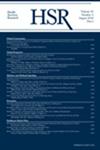Perinatal care among Hispanic birthing people: Differences by primary language and state policy environment
Abstract
Objective
The study aims to examine maternal care among Hispanic birthing people by primary language and state policy environment.
Data Sources and Study Setting
Pooled data from 2016 to 2020 Pregnancy Risk Assessment Monitoring System surveys from 44 states and two jurisdictions.
Study Design
Using multivariable logistic regression, we calculated adjusted predicted probabilities of maternal care utilization (visit attendance, timeliness, adequacy) and quality (receipt of guideline-recommended care components). We examined outcomes by primary language (Spanish, English) and two binary measures of state policy environment: (1) expanded Medicaid eligibility to those <133% Federal Poverty Level, (2) waived five-year waiting period for pregnant immigrants to access Medicaid.
Data Collection/Extraction Methods
Survey responses from 35,779 postpartum individuals with self-reported Hispanic ethnicity who gave birth during 2016–2020.
Principal Findings
Compared to English-speaking Hispanic people, Spanish-speaking individuals reported lower preconception care attendance and worse timeliness and adequacy of prenatal care.
In states without Medicaid expansion and immigrant Medicaid coverage, Hispanic birthing people had, respectively, 2.3 (95% CI:0.6, 3.9) and 3.1 (95% CI:1.6, 4.6) percentage-point lower postpartum care attendance and 4.2 (95% CI:2.1, 6.3) and 9.2 (95% CI:7.2, 11.2) percentage-point lower prenatal care quality than people in states with these policies.
In states with these policies, Spanish-speaking Hispanic people had 3.3 (95% CI:1.3, 5.4) and 3.0 (95% CI:0.9, 5.1) percentage-point lower prenatal care adequacy, but 1.3 (95% CI:−1.1, 3.6) and 2.7 (95% CI:0.2, 5.1) percentage-point higher postpartum care quality than English-speaking Hispanic people. In states without these policies, those same comparisons were 7.3 (95% CI:3.8, 10.8) and 7.9 (95% CI:4.6, 11.1) percentage-points lower and 9.6 (95% CI:5.5, 13.7) and 5.3 (95% CI:1.8, 8.9) percentage-points higher.
Conclusions
Perinatal care utilization and quality vary among Hispanic birthing people by primary language and state policy environment. States with Medicaid expansion and immigrant Medicaid coverage had greater equity between Spanish-speaking and English-speaking Hispanic people in adequate prenatal care and postpartum care quality among those who gave birth.


 求助内容:
求助内容: 应助结果提醒方式:
应助结果提醒方式:


